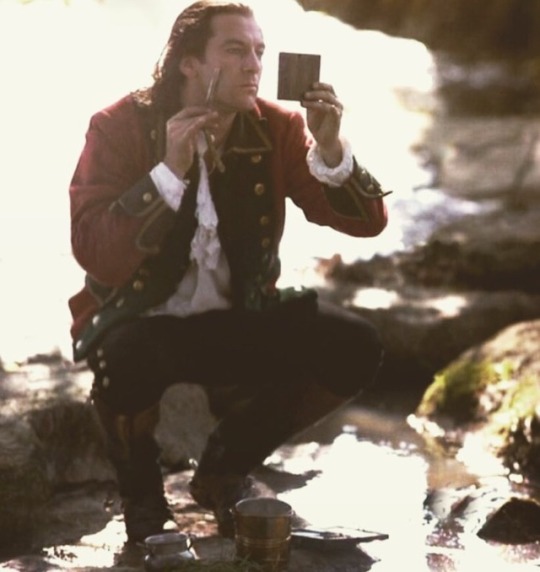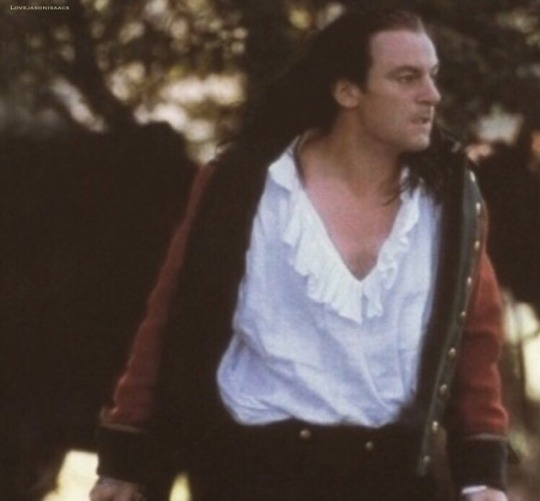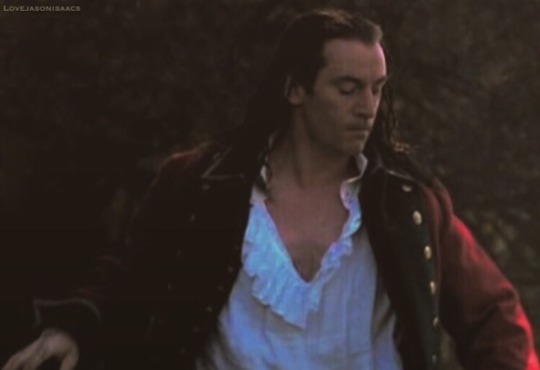#william tavington wednesday
Text
One aspect of Gladiator that has stuck with me since my rewatch earlier this month and through subsequent discussions with @malicious-compliance-esq is how well the opposition of the hero and villain works. Part of the reason, ironically, is how much they have in common. Maximus and Commodus are not only both Roman men. they are both sons of Marcus Aurelius, which allows comparison from multiple points of view within the story: Marcus himself, Lucilla, and the Roman people collectively. Commodus references the list of Roman Virtues his father wrote to him about, confessing that he has none of them. Marcus agrees, describing Commodus as "not a moral man" and telling Maximus, "You are the son I should have had." Lucilla tells Maximus that she is terrified every hour of what Commodus will do to her and her son and that "The only time I ever felt safe was with you." The more Maximus defies Commodus as a gladiator, the more the people love him. Their proximity is used to highlight their opposing traits, making for clear, clean, simple, effective storytelling.
The Patriot's opposition of Benjamin Martin and William Tavington is far murkier. One reason is the jingoism that lies in the film's framing of difference in terms of binary opposition. The British and American Patriot characters are on opposing sides in a war but are more alike than different. They share the same language, religion, even military customs as we see when Martin attempts to school Tavington on the rules of war. Martin is himself a former officer of a Colonial British regiment. A slightly more effective, but still questionable binary the film sets up is gentleman/rustic. Cornwallis extolls the virtues of "gentleman in command" to both lead and restrain their men and is mortified at the end of the film to find himself defeated by an army of "peasants." Martin, however, manages to be both at the same time. He is equally comfortable in a rowdy tavern and an assembly of South Carolina landowners, or even a meeting with a British general: a man for all seasons. When Gabriel has reservations about the men his father has recruited, Martin says. "They're exactly the sort of men we need. They've fought this kind of war before." He is not referring to their uncouth appearance and manners but the ferocity and unconventional approach to warfare that made them effective guerilla fighters. Who else has these traits?
Though Cornwallis describes Tavington as coming from an esteemed family, his fellow officers clearly do not recognize him as a peer. We see this when he arrives at a gathering with blood on his cravat from the battle the British just won and they look at him like he forgot to wear pink on Wednesday. Cornwallis reprimands him for executing surrendering enemy soldiers, the same thing Martin forbids his men from doing (also after it's too late to stop them). While Martin being neither gentleman nor rustic but somehow both at once wins him the respect of both sides, the traits Tavington shares in common with rustics make him a pariah among gentlemen, but this is less a difference between the two men than between British and Patriot values. That Martin and Tavington both collapse this binary means not only are they more alike than different, but they have more in common with each other than either one has with anyone on his own side.
No one in the film can comment on this similarity because no one has enough proximity to Martin and Tavington to notice it. The focus of the few scenes they share is on a third binary the film attempts to construct: child killer/father. Again, these things are not opposites. For one, the two are not mutually exclusive. Whether through intent, accident, or negligence, fathers are regularly responsible for the deaths of their own children. The opposite of a child killer would be a child protector. Does Martin fit the bill? Well, let's see. In the scenes immediately following Tavington's murder of his son Thomas, he abandons his youngest children in a field by his burning house, orders his next youngest sons to shoot British officers, and when the son he did all this to free is used as a human shield, Martin throws a tomahawk at his head to take out his captor. The only scene where Martin may be said to protect his children comes when he lures the Green Dragoons away from the burning plantation. However, the dragoons are only there in the first place because Martin blew his cover at Fort Carolina to save his captured men. The majority of Martin's children survive his negligence, but those of his men are not so lucky. He has no qualms about both making them targets of British aggression and eliminating their main source of protection from that aggression by recruiting their fathers. So much for "I am a parent; I can't afford principles."
Gladiator's comparison of Maximus and Commodus is effective because they are judged by the same standard: Maximus meets, even exceeds it, while Commodus does not. The Patriot, however, applies very different standards to strikingly similar characters. All of Tavington's reprehensible choices are made with an end goal of British victory, yet neither he nor anyone else can imagine a future for him in England in which those choices are not harshly condemned. Meanwhile, Martin's past war crimes and more recent abandonment/endangerment of his children are presented asforgivable, even laudable, because of the results he achieves. "The honor is in the ends, not the means," or something like that.
#gladiator 2000#the patriot#general maximus#emperor commodus#benjamin martin#william tavington#the villain and hero two-step once again#villain discourse#2000 what a crazy year
26 notes
·
View notes
Photo


William Tavington Wednesday 😍
140 notes
·
View notes
Photo

William Tavington Wednesday!
29 notes
·
View notes
Note
You should have an edit of one Jason's characters for every day of the week!! Just an idea :)
I was doing that on Instagram but idk...it got tiring 😂 So now I just do Malfoy Monday and Tavington Tuesday/William Tavington Wednesday. Lol
4 notes
·
View notes